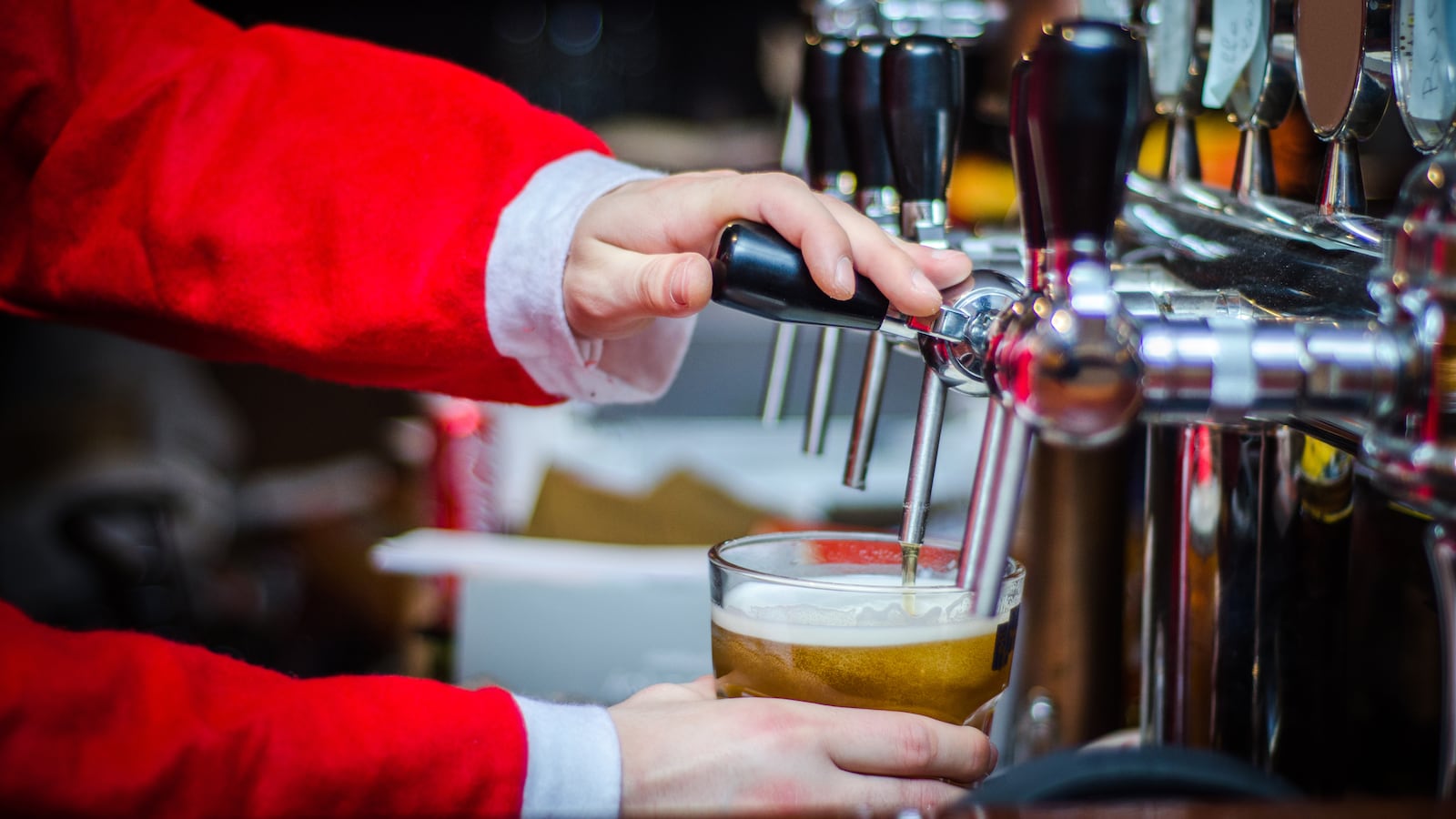The first bartender I asked about working on Christmas Eve quickly responded that “fortunately or unfortunately, I’ve never worked in a bar that was open on Christmas Eve,” which I think sums up something key about the holidays: They can go either way.
It’s also important to note that not every joint is open. Neyah White, who owns the pop-up bar LTO, and the Decoy Room Bottle Shop in Chestertown, Maryland, told me that the night before Thanksgiving is the biggest bar night on the East Coast, and that Christmas Eve is equally huge.
When I was visited by the Ghost of Christmas Eves Past that I’ve Spent in Bars, the first vignette he shared with me was a hilarious time at an Irish Pub in a strip mall in the suburbs. My wife and I were back in Richmond, Virgina, for the holidays, it was twenty-odd years ago, and the room was full of old friends and people we hadn’t seen in months. The place was crowded and everyone was laughing. People were passing around pitchers of Harp Beer. The whole memory is like a laugh reel—just friendly faces, toothy smiles, backslapping and hugs and frothy mugs of beer. Everyone is back home, and they all steal away for a moment and load the jukebox with funny songs from our past.
It’s not a formal reunion, it just ends up happening. In smaller towns, it’s inevitable, but even in small cities, I’ve seen joints spontaneously explode with good cheer as high school friends run in to one another.
“People just pick up the conversation where they left it 10 years ago,” said Neyah.
But the first time he spent Christmas Eve in San Francisco, he got his bar all prepped for a big night, and was amazed that no one showed up. They’d all gone home for the holidays.
I spent a few Christmases alone in New York City. No, I was not an outcast, or a maudlin depressive, or alienated from my friends and family. I was just a Jewish graduate student who wanted to get some writing done, and whose girlfriend wanted to spend some time back at home. At first, I wasn’t sad at all, but then I walked around the corner to pick up some takeout chow fun. The streets were empty, the wind was like daggers, and there was a sad wilting Christmas tree blinking in the window of a closed store. I certainly started to feel as if things might take a turn for the worse and I might end up in that infamous Pogues song.
One frigid Christmas Eve (it actually might have been Christmas, but for our purposes let’s say it was Christmas Eve) a buddy and I ended up at New York’s Village Idiot, a cavernous, smelly bar on fourteenth street, which attracted a mix of art students, local degenerates and hipsters. (It’s fortunately no longer around having closed several years ago.) One of the bartenders was wearing well placed pieces of electrical tape for a top and the other had “Christmas Present” written in Sharpie on the back of her shirt with an arrow pointing down. The televisions were playing videos of car crashes and pornography, the jukebox was playing the usual mess of Charlie Daniels and rock. At first, it seemed like the night would play out like a scene from a Bukowski book or would end up with one of us checking into the nearby St. Vincent’s hospital. But in fact we had a grand time, and my friend fell so hard for the “Christmas Present” bartender that they dated for years. She came to my wedding. I am still friends with her. Even in that dive, the atmosphere was somehow transformed by the holiday.
“It’s a team effort,” says Neyah. “I’m always more generous. There’s always a couple of bottles of bubbly open, and lots of it gets poured. It might show up on a check, it probably won’t. The guests are more generous, too. People mean it when they say thank you.”
This comes, Neyah thinks, from the fact that anyone working on Christmas Eve is usually being unselfish and truly enjoys the festive atmosphere. There are no customers and no staff, just a bunch of folks celebrating the holiday.
But there’s always the threat, after all, that things could sour. It’s up to the bartender, I think, more than anyone else, to make sure that the darkness doesn’t settle in over the joint. My Ghost Bartender of Christmas Eves Past that I Spent in Bars also showed me a few slides from some dimly lit evenings where the establishments were tense, a couple of bar fights narrowly avoided.
You’ve got to work to set the mood, in other words.
At LTO, that shouldn’t be a problem, since Neyah plans to be dressed as Santa tonight. He’s considering finding a last-minute tree and getting people to decorate it—hang a decoration before you get your first drink.
“Silly rituals can be so important,” Neyah says, and then he starts talking about caroling. “Public singing is the dumbest thing, but it’s so wonderful.” He insists he can’t sing and has no business singing in public, but it doesn’t matter, “because everyone is failing together. It’s important to sing in public sometimes.”
He wants LTO to be the front porch of his town. The idea of the third space—not home, not work, the space where you interact with the community—is important to him.
When you are in this third space, you aren’t thinking about your job, or money problems. It’s not cozy family time, nor is it a part of your daily grind. The public house is a great equalizer—everyone is just there to be there, for no greater purpose than to have fun and be together.
Merry Christmas!






